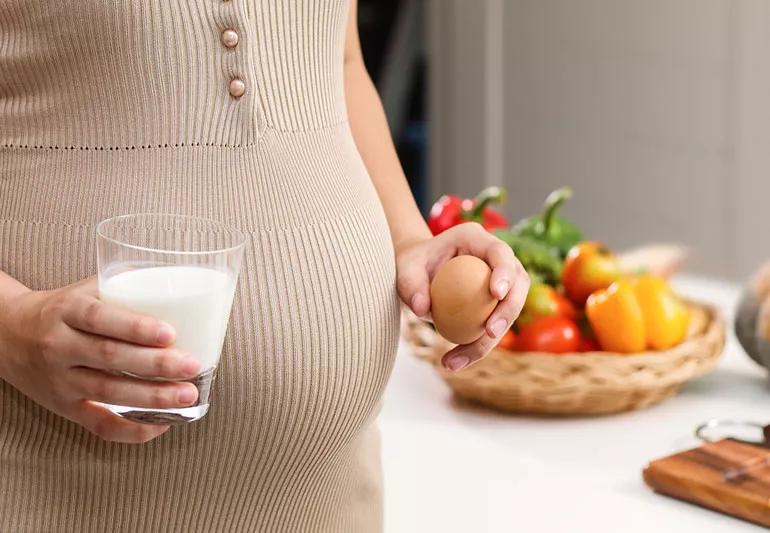Planning and variety are two keys to success

Image content: This image is available to view online.
View image online (https://assets.clevelandclinic.org/transform/bdb05c65-4a56-4d05-9976-fe580a1decc5/veganPregnant-1154913643-770x533-1_jpg)
consuming a vegetarian diet while pregnant
There are many benefits of plant-based eating. But is it safe to exclude meat when you’ve got a whole-grain bun in the oven? Registered dietitian Julia Zumpano, RD, LD, shares her tips for being a pro at pregnancy while still being pro-plants.
Advertisement
Cleveland Clinic is a non-profit academic medical center. Advertising on our site helps support our mission. We do not endorse non-Cleveland Clinic products or services. Policy
Vegetarian diets are nutritional powerhouses because they are:
The tricky part of eating vegetarian while you’re pregnant, explains Zumpano, is that your protein needs increase during those months.
Zumpano says the average pregnant woman needs 71 to 75 grams of protein a day during pregnancy. That number can be even higher due to a number of factors, including if you’re carrying multiples. If you want to eat vegetarian during pregnancy, it’s best to see a dietitian for a personal assessment to know your specific protein needs.
“It’s definitely doable to eat vegetarian while pregnant — I did it myself — but you need to plan your meals around protein to ensure you’re getting enough, which may also include protein supplements.”
A vegetarian diet typically cuts out meat, but there is a lot of grey. Some vegetarian diets include eggs and dairy. A vegan diet has no meat, dairy or eggs. A pescatarian diet is plant-based but includes fish. Is one type better during pregnancy?
“If someone is open to less restrictive eating during pregnancy, I try to guide them that way because it can be easier to fill the nutritional requirements,” says Zumpano. “For example, if someone is vegan but open to dairy during pregnancy, I would encourage that shift so they can get their protein and calcium needs met by food sources.”
Advertisement
If you’re set on a vegan pregnancy or don’t want to adjust your eating habits, you’re still good. You’ll just need to use a supplement or a vegetarian product like tofu to meet the nutritional needs of you and your baby.
All pregnant people, whether or not they eat meat, need to take a quality prenatal vitamin. If the vitamin doesn’t contain enough calcium or folate, you may need additional supplementation.
A high-variety diet can help you meet your nutritional requirements in pregnancy:
There are also some foods you should avoid:
Advertisement
If you want to ensure complete nutrition during a vegetarian pregnancy, it’s best to plan ahead. Zumpano recommends making a list of the fruits, veggies, proteins and grains you’re willing to eat and then planning your meals around them.
“Probably the hardest time to successfully eat vegetarian is during the first three months of pregnancy,” says Zumpano. “If you have morning sickness or nausea, food may not taste good. Or you don’t feel like eating for fear it will all come back up. It can be almost impossible to eat a complete diet in this situation.”
To avoid having soda crackers as your primary food source, Zumpano recommends:
Advertisement
You’ll likely find it easier to meet all your nutritional needs in trimesters two and three (when you don’t feel like retching all day). But you can use these tips at all points in your pregnancy to ensure your baby gets the best nutrition for a healthy start in life
These recipes can help you get started in developing a nutritionally complete eating plan:
Advertisement

Delivered every Tuesday!
Sign up for our Health Essentials emails for expert guidance on nutrition, fitness, sleep, skin care and more
It's a letter about the news!

Every two weeks once
Sign up for our Health Essentials emails for expert guidance on nutrition, fitness, sleep, skin care and more.
Learn more about our editorial process.
Advertisement
Talk with them about their new sibling early and often
Dental care is not only safe during pregnancy, but it’s also highly recommended
A healthy pregnancy diet includes good amounts of folic acid, DHA, calcium and more
Always talk with your doctor for advice, too
Healthcare providers recommend waiting until week 13 to dye your hair, just to be safe
There’s only one proven way to stack the deck in favor of a boy or a girl
Having a baby after a loss can bring unexpected emotions
Your second-trimester is usually the best time to travel
Type 2 diabetes isn’t inevitable with these dietary changes
Applying a hot or cold compress can help with pain
Pump up your iron intake with foods like tuna, tofu and turkey